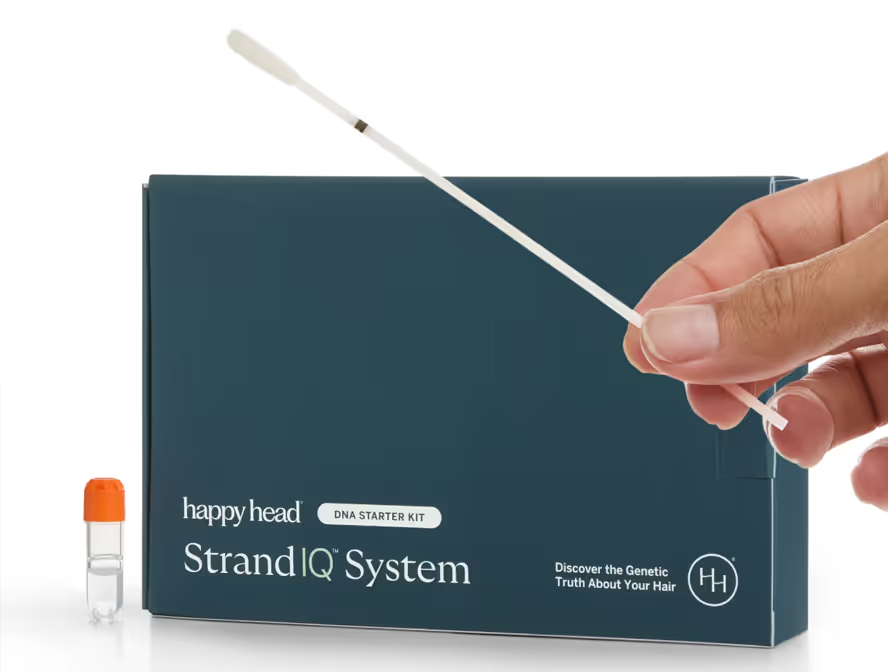Rosemary oil for hair is hardly a new idea—its use traces back to ancient Mediterranean cultures that prized the herb for its healing and invigorating properties. Today, this time-honored remedy is resurfacing with modern relevance, thanks to growing interest in natural wellness.
Rosemary oil is being backed by emerging science, but with so many hair loss treatments available, how do you know if it’s right for you?
In this guide, we’ll explore the science, benefits, and best practices regarding rosemary oil for hair growth to help you decide whether it deserves a place in your daily hair care routine.
What Is Rosemary Oil?
Rosemary oil is an essential oil derived from the Rosmarinus officinalis plant, known for its distinctive aroma and potential health benefits.
This versatile oil is extracted from the leaves of the rosemary plant through steam distillation. The resulting oil is a concentrated liquid that contains the plant's active compounds, including rosmarinic acid, camphor, and 1,8-cineole.
Health Benefits of Rosemary Oil
Rosemary oil has long been used in traditional medicine for its wide-ranging health benefits. Rich in antioxidants and anti-inflammatory compounds, it may help protect the body against cellular damage and reduce systemic inflammation.
Rosemary oil is also known for its antimicrobial activity, which supports skin health and immune defense. Inhalation of its aroma may enhance memory, concentration, and mood, making it a popular choice in aromatherapy for cognitive and emotional support.
How Does Rosemary Oil Support Hair Growth?
Rosemary oil supports hair growth through multiple mechanisms. It enhances blood circulation to the scalp, improving nutrient and oxygen delivery to hair follicles, which leads to thicker, healthier, stronger hair that resists breakage.
Its anti-inflammatory and antioxidant properties help protect follicles from oxidative stress, which can contribute to thinning and shedding.
Rosemary oil's antimicrobial properties can help maintain a healthy scalp environment by combating bacteria and fungi that can lead to dandruff and irritation. Its soothing properties may also help reduce inflammation and itchiness, promoting a more balanced and comfortable scalp.
One of the most significant benefits, however, is its potential to inhibit dihydrotestosterone (DHT), a hormone known to shrink hair follicles and contribute to androgenetic alopecia (pattern hair loss). By reducing DHT activity, rosemary oil may slow or prevent follicle miniaturization.
Scientific Studies on Rosemary Oil for Hair Growth
A 2015 study published in the journal SKINmed compared the effects of rosemary oil and minoxidil, a common hair growth treatment, on individuals with androgenetic alopecia (pattern baldness).
The study found that both treatments significantly increased hair count after 6 months, with no significant difference between the two groups. This suggests that rosemary oil may be as effective as minoxidil in promoting hair growth.
In another study conducted on mice that underwent testosterone treatment to induce hair loss, researchers found that rosemary essential oil, particularly the active compound 12-methoxycarnosic acid, strongly inhibited the binding of DHT to androgen receptors and led to improved hair regrowth.
During a 2022 study, researchers studied the effects of oleogels made with beeswax, rosemary oil, and cedarwood oil on a group of 18 rats. At the end of the 6-week trial, they found that a 10% rosemary oleogel had similar effects as the positive control, which was 2% minoxidil.
How Rosemary Oil Compares to Other Hair Growth Treatments
Rosemary oil and proven treatments such as minoxidil and finasteride all support hair growth, but they work in different ways.

Prescription minoxidil, an FDA-approved vasodilator, promotes hair growth by increasing blood flow to follicles and prolonging the anagen phase. Prescription finasteride, also FDA-approved, blocks 5α-reductase, reducing DHT levels that shrink follicles in androgenetic alopecia.
Rosemary oil may act similarly by improving circulation and mildly inhibiting DHT, but it lacks FDA approval and large-scale human trials. While studies suggest it’s comparable to 2% minoxidil in mild cases, its long-term effectiveness is less established.
Rosemary oil is generally well-tolerated, making it appealing for those avoiding pharmaceuticals and their associated side effects, but it may be less potent than minoxidil or finasteride for moderate to advanced hair loss.
If you’ve tried rosemary oil for hair growth and are not satisfied with the results, dermatologists at Happy Head are ready to help.
We’ll review your medical history and hair loss severity online and create a customized treatment plan tailored to your specific needs and discreetly shipped directly to your door.
With ongoing medical support and the option to adjust formulations if needed, hair loss treatment doesn’t get any easier than this.
How To Use Rosemary Oil for Hair
There are several ways to incorporate rosemary oil into your hair care routine, depending on your preferences and needs.
Direct Scalp Application
One of the most effective ways to use rosemary oil for hair is to apply it directly to the scalp. Mix a few drops of rosemary oil with a carrier oil, such as coconut or jojoba oil, to dilute it and prevent potential irritation.
Massage the mixture into your scalp using your fingertips, focusing on areas where hair loss or thinning is most noticeable. Leave the oil on for at least 30 minutes, or overnight for maximum benefits, before washing your hair as usual.

Mixing Rosemary Oil With Shampoos and Conditioners
Another easy way to incorporate rosemary oil into your hair care routine is by adding a few drops to your regular shampoo or conditioner.
Simply add 2–3 drops of rosemary oil to a quarter-size amount of shampoo or conditioner in your palm, mix well, and apply to your hair and scalp as normal.
Creating Homemade Rosemary Oil Hair Treatments
For a more intensive treatment, you can create a homemade hair mask or hot oil treatment using rosemary oil.
Combine rosemary oil with other nourishing ingredients, such as avocado, honey, or yogurt, to create a moisturizing and stimulating hair mask. Apply the mixture to your hair and scalp, cover with a shower cap, and let it sit for 30 minutes to an hour before washing and rinsing thoroughly.
Rosemary Oil for Hair Growth: When To Expect Results
Visible results from rosemary oil typically appear after 3 to 6 months of consistent use, with early signs including reduced shedding and improved scalp health.
Continued application may lead to gradual thickening and regrowth in thinning areas, especially in cases of early-stage androgenetic or stress-related hair loss.
Tips for Getting the Best Results With Rosemary Oil for Hair
Maximizing the benefits of rosemary oil requires more than just regular application. From choosing the right formulation to following best practices, small decisions can significantly impact your results.
Select High-Quality Rosemary Oil
For optimal results, choose 100% pure, therapeutic-grade rosemary essential oil labeled Rosmarinus officinalis (chemotype cineole or verbenone).
Avoid synthetic fragrances or diluted products. Opt for oils packaged in dark glass bottles to preserve potency, and ensure third-party testing or GC/MS analysis to confirm purity and concentration of active compounds.
How Often To Apply Rosemary Oil
The frequency of application will depend on your individual hair needs and tolerance. Start by using rosemary oil once or twice a week, and gradually increase the frequency if desired. Be sure to monitor your scalp for any signs of irritation or sensitivity.
Recommended Dosage and Dilution
When using rosemary oil for hair, always dilute it with a carrier oil to prevent potential skin irritation. A safe dilution ratio is typically 2–3 drops of rosemary oil per teaspoon of carrier oil. Avoid applying undiluted rosemary oil directly to your scalp or hair.
Who Should Avoid Rosemary Oil for Hair
While rosemary oil is generally safe for most people, some individuals may experience allergic reactions or skin sensitivities. If you have a known allergy to rosemary or other essential oils, it's best to avoid using rosemary oil for hair.
Additionally, pregnant or breastfeeding women should consult their healthcare provider before using rosemary oil or any other essential oils.
Potential Side Effects of Rosemary Oil for Hair
Although rosemary oil is a natural ingredient, side effects are possible. Some people may experience skin irritation, itching, or redness when using rosemary oil, particularly if they have sensitive skin or apply the oil in high concentrations.
If you notice any adverse reactions, discontinue use immediately and consult a dermatologist if symptoms persist.
To minimize the risk of side effects, always dilute rosemary oil with a carrier oil before applying it to your scalp or hair. Perform a patch test on a small skin area before using rosemary oil for the first time to check for any allergic reactions.
Rosemary Oil for Hair: Is It Right for You?
Choosing the right hair growth solution isn’t just about what works—it’s about what works for you. If you’re seeking a gentle, natural option with emerging scientific support and minimal risk, rosemary oil may be a strong starting point.
However, if you’re facing significant or progressive hair loss, especially with a genetic component, consulting a dermatologist about proven medical treatments may be more effective.
The key is to align your approach with your goals, tolerance for risk, and commitment to consistency. Whether used alone or as part of a broader plan, it's essential to use rosemary oil for hair growth safely and consult with a medical professional if you have any concerns.
Talk to a board-certified dermatologist to discuss your goals and find the solution that is best for you.
Frequently Asked Questions
Does rosemary oil really help hair grow?
Yes, research shows rosemary oil may promote hair growth by improving scalp circulation, reducing inflammation, and supporting follicle health. It’s especially noted for helping with androgenetic alopecia, though results vary by individual.
What is the best carrier oil for rosemary?
Jojoba and coconut oils are top choices for carrier oils. Jojoba mimics the scalp’s natural oils and absorbs well, while coconut oil offers deep conditioning and antimicrobial benefits. Both enhance rosemary oil’s effectiveness and reduce the risk of irritation.
How long should I leave rosemary oil in my hair for hair growth?
For best results, leave diluted rosemary oil on your scalp for at least 30 minutes before rinsing. Some prefer overnight treatments, though care should be taken to avoid staining bedding. Consistency is key—using it 2–3 times weekly can help stimulate growth over time.
Why is my hair falling out after stopping rosemary oil?
Stopping rosemary oil may lead to shedding if the treatment was maintaining hair growth or reducing inflammation. Like many treatments, its effects may reverse when discontinued, especially in cases of androgenetic alopecia. Speak with a dermatologist for guidance.












